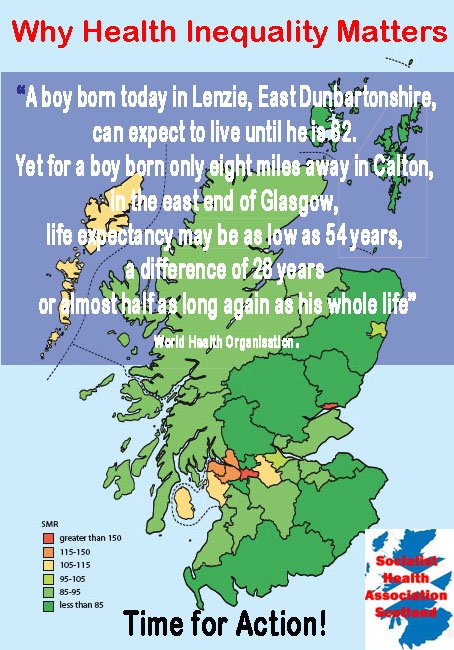In fairness, there is a significant degree of consensus on the NHS. Even the Tories are not pushing marketisation and there is a broad agreement that Scotland doesn't want to go down the English route. Unsurprising, given the shambles Hunt has delivered over the junior doctors dispute.
There is a modest potential for structural change in the SNP manifesto, with a commitment to review the ‘number, structure and regulation’ of health boards and their relationship with councils. Even here we suspect this is more about attacking councils, given the SNP government's outright hostility to local democracy.
The SNP's main pledge is to increase the NHS revenue budget by £500m ‘by the end of this parliament’. This is a very modest 4% increase over five years and they hope to get that from the Barnett consequential of English NHS spending. There is a very important analysis of English health spending by Professor Andrew Street at the University of York that points out that the claimed £8.4bn increase in spending by 2020-21 is actually closer to £4.5bn. This illustrates the risk in linking Scottish taxation policies to George Osborne's austerity whims for the whole of the next parliament. Whatever SNP policy may be - it isn't anti-austerity.
To spin a more impressive number, they have compounded the annual increase to get £2bn. However, they are also committed to investing £1.3m ‘from the NHS’ to build up social care capacity. It is unclear if that is over and above the NHS revenue increase - it wasn't it this year's budget. This is a big dent in the NHS spend and again the SNP are trying to spend the same money twice. Claiming that the local government budget cut is not as great as it appears because of the social care cash, while omitting to mention that this also means that NHS Scotland is not getting similar funding to their English counterparts.
Of course spending on social care is welcome, as bed blocking is a real problem and service providers are struggling to recruit and retain staff. The extra cash will help pay for the commitment to pay the living wage, although there is already considerable doubt if that has been properly funded. There is no commitment to tackle the other pressing issues in social care including training, and most importantly, allocating sufficient time to provide adequate care. There is a commitment to “work to end ‘time and task’ based care”.
The extra 500 health visitors for the 'named person' scheme are also confirmed as is training for an additional 500 advanced nurse practitioners. The student bursary will continue in Scotland. There will be another 1000 paramedics ‘working in the community’. £150m is identified for mental health services and that is a welcome focus for a service that has been under resourced in recent years. There is £200m for 5 elective treatment services, although that level of funding has been questioned by doctors leaders and others.
Scottish Labour's manifesto does at least get its priorities right. They start with health inequality saying, "In order to tackle health inequalities we must tackle inequality in society in general. Labour will stop the cuts that do so much to entrench inequality and drive people into poverty."
That is of course the key point. Scottish Labour not only raises progressive taxation, but it spends that resource on public services that do so much to address inequality. Tinkering with the NHS of course helps, but it is simply treating the symptoms of ill health, not the root cause.
The preventative theme is evident in other Labour commitments to fund and revitalise primary care and mental health services. Both of which have been under resourced in the past nine years of SNP government. The only significant slip up is the 48 hour GP appointment pledge. When will politicians learn that this type of target simply drives managerial game playing and does nothing to improve services.
According to the BBC poll, the NHS remains the top issue with the public. That's because unlike many other public services, we all use the NHS and it generally meets our expectations. However, the most enduring health challenge in Scotland is health inequalities, and it is preventative spending that will avoid future demands on the NHS that governments may be unable to meet.
So, simply passing on Tory austerity isn't the solution. We have to use the devolved powers to take a radically different approach in Scotland. That's why Scottish Labour's priorities are really stronger for Scotland.


 RSS Feed
RSS Feed